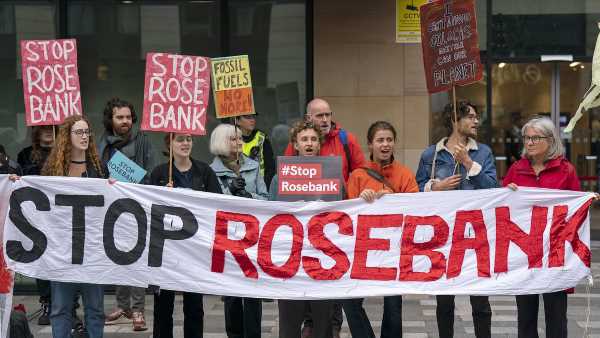LIAM HALLIGAN: Eco-zealots will rant, but this new oil field is vital for the UK’s energy security
Since June, the price of oil has spiralled from around $70 to $95 a barrel. That’s a whopping 35 per cent rise in just three months.
No wonder petrol and diesel prices soared over the summer. Indeed, August saw the sharpest monthly increase in the cost of filling up in more than 20 years.
But the oil price isn’t rising because the global economy is booming, driving up demand for the black stuff. On the contrary, growth in many countries is sluggish, as the post-pandemic world has struggled to reboot.
No, oil has spiked because the 13-nation Opec exporters’ cartel, which controls half of global production and four-fifths of known reserves, has been deliberately pumping less crude than is needed, in a successful bid to keep prices artificially high.
This is the background against which the Government announced that the development of a controversial North Sea oil field has been given the go-ahead.
Campaigners take part in a Stop Rosebank emergency protest outside the UK Government building in Edinburgh, after the controversial Equinor Rosebank North Sea oil field was given the go-ahead
Rosebank, which lies about 80 miles north-west of Shetland, is among the largest undeveloped discoveries in UK waters, with an estimated 300million barrels of oil.
READ MORE: Rishi Sunak hails the approval of a major oil and gas project as he says the invasion of Ukraine proves the UK has to drill
You might think that adding such a significant resource to our energy capacity at a time when we are being held to ransom by Opec – and the Russians into the bargain – would trigger an outburst of national rejoicing. Instead it sparked a wave of criticism from the usual suspects.
Giving Rosebank the green light ‘undermines the UK’s claims to climate leadership on the world stage’, said Chris Skidmore MP, the Tories’ former ‘net zero tsar’.
Green Party MP Caroline Lucas described the decision as ‘morally obscene’ and went on Radio 4’s flagship current affairs show, Today, to drive her point home.
She claimed 90 per cent of the new field’s output would be oil, not gas, and most of it would be exported ‘because it’s not the sort of oil that we use in our own refineries’.
But the interviewee next up on yesterday’s edition of Today was the executive chairman of Ithaca Energy, the British firm that will be developing Rosebank in partnership with Norwegian energy giant Equinor.
He said the Ithaca/Equinor consortium ‘will be using and selling the majority of the Rosebank oil in the UK’.
Protests have taken place across the UK in opposition to the Rosebank project
Rishi Sunak scaled back the UK’s net-zero plans in a major policy shake-up last week
It goes without saying we have to take climate change seriously but the nation’s energy security is too sensitive an issue to be used as a platform for point-scoring and polemic. The eco-zealots’ knee-jerk response to a move that will help reduce our reliance on imported energy at a time when Russia’s war against Ukraine has highlighted our vulnerability is irresponsible in the extreme.
The truth is that using North Sea energy makes eminent sense – given that, for all the talk of renewables, Britain will be using huge amounts of fossil fuels for decades to come.
Oil and gas currently account for 70 per cent of the UK’s energy needs, once transport is included. By the mid-2030s, that share will still be around 50 per cent – and that’s according to the Climate Change Committee, the pro-green watchdog with statutory powers to monitor the Government’s progress towards lower carbon emissions.
Even by 2050 – when we are supposed to be at ‘net zero’ emissions – oil and gas will still generate around a quarter of all energy used across the UK. And many would say the committee’s estimates on the take-up and efficiency of renewable energy are far too rosy. So this continued reliance on fossil fuels is likely to be greater still.
Given that we need more oil and gas, then, why not use our own? Producing here means we can avoid the cost of imported energy and the massive carbon emissions often associated with it.
Since Russia’s invasion of Ukraine, for instance, the UK and Western Europe have become heavily reliant on liquified natural gas imported from the US.
But just think of the energy involved in drilling gas in America, liquifying it, then loading it on to diesel-powered tanker ships – which then have to travel 3,000 miles across the Atlantic. That LNG must then be regasified before use – the entire process emitting far more carbon than drilling for our own energy in the North Sea.
As a net energy importer, with little gas storage, the UK has an energy security problem – so it surely makes sense to produce what we can.
Protesters against the Rosebank project in Edinburgh yesterday
Rosebank could soon account for almost 10 per cent of the UK’s total oil production. Cheaper fuel is the key to escaping this cost of living crisis and getting our economy moving – and producing locally keeps both costs and carbon emissions down. Developing Rosebank will also create around 2,500 jobs – as the mighty GMB union yesterday reminded the Labour Party.
The climate zealots will rant and rave but the UK has recently taken some important steps in forging a more moderate and sensible path to a clean energy future, one the public at large can support.
Finally, Rishi Sunak is taking some bold decisions. After almost a year in No 10 it’s not a moment too soon.
Liam Halligan is an economics commentator
Source: Read Full Article




